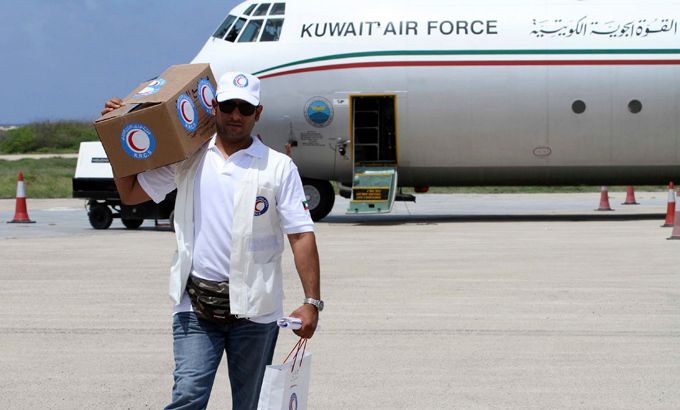Red tape delays Africa aid airlift
Flights carrying food for drought-stricken Horn of Africa rescheduled owing to administrative complications.

The UN is preparing to airlift food aid to the drought-stricken areas of the Horn of Africa, but flights have been delayed due to administrative complications.
Airlifts were to begin on Tuesday to the Somali capital of Mogadishu, Dolo in Ethiopia and Wajir in Kenya. Now, officials say, they will not start until Wednesday.
Keep reading
list of 4 itemsCould shipping containers be the answer to Ghana’s housing crisis?
Thousands protest against over-tourism in Spain’s Canary Islands
Holding Up the Sky: Saving the Indigenous Yanomami tribe in Brazil’s Amazon
The scheduled flights were delayed after a wait for clearance permission in Nairobi, Kenya, where the mission is being flown from, did not come on time.
In a statement released on Tuesday, the aid agency Doctors Without Borders said: “Whilst many of these refugees remain on the outskirts of the camps they are still not receiving adequate assistance. Delays in registration and access to food, water and shelter are tipping them over the edge.”
David Orr, a World Food Programme spokesman, said: “The aircraft are loading with the hope that they can take off on Wednesday.
“This will be the first of series of flights – once they start, they will just keep coming and coming in an ongoing operation.”
An emergency meeting of UN aid agencies and charities was held in Rome on Monday, where the decision to airlift food had been made.
‘Catastrophic situation’
At the meeting, Jacques Diouf, head of the UN Food and Agriculture Organisation, or FAO, urged world leaders to act fast.
“The catastrophic situation demands massive and urgent international aid,” he said.
UN officials say the drought has killed tens of thousands of people over the past few months, and has forced desperate survivors to walk for weeks in search of food and water. More than 12 million people are at risk of starvation.
The situation in southern Somalia has deteriorated so badly that the UN has declared it a famine zone.
The International Red Cross has delivered 400 tonnes of food to drought affected areas of southern Somalia, controlled by al-Shabab fighters.
But the WFP says it is still being blocked from areas controlled by the opposition group. Many famine victims have been forced to travel between Somalia and Kenya to seek food and shelter – walking along a road that Bruno Le Maire, the French food minister, has described as “a road of hope, but also a road of death”.
Josette Sheeran, the WFP chief, witnessed the devestation first-hand.
“What we saw is children who are arriving so weak that many of them are in stage four malnutrition and have little chance – less than 40 per cent chance – of making it,” he said.
“We also heard from women who had to leave babies along the road and make the horrifying choice of saving the stronger for the weaker or those who had children die in their arms.”
Speaking to the Reuters news agency, Iradho Bara Ali, an internally displaced Somali resident who received aid on Sunday, said: “Today we are happy because we have received the food from the aid organisations. We hope to get more from other organisations, we are happy that the aid organisations came here to help.”
Scale of the disaster
Touring the region, Kristalina Georgieva, the EU humanitarian aid chief, told the Associated Press news agency that it was time the international community realised the scale of the disaster and what must be done to avoid it happening again in the future.
“What we are facing is a world where disasters are more frequent and more intense and with climate change and population growth it’s going to be even more painful in the future,” she said.
The UN has received $1bn since launching an appeal for the region in November 2010, but needs a billion more by the end of the year to stave off widespread starvation.
Al Jazeera’s Alan Fisher, reporting from Rome, said: “The UN wants firm commitments from anyone who is saying, ‘yes we will pledge money’.”
Ban Ki-moon, the UN secretary-general, has called on donor countries to come up with $1.6bn in aid for the two regions of southern Somalia designated by the UN as famine zones.
For its part, the World Bank pledged on Monday more than $500m for the region, with the bulk of the money going towards long-term projects to aid farmers.
However, $12m will be immediately released for relief projects for those worst hit by the drought.